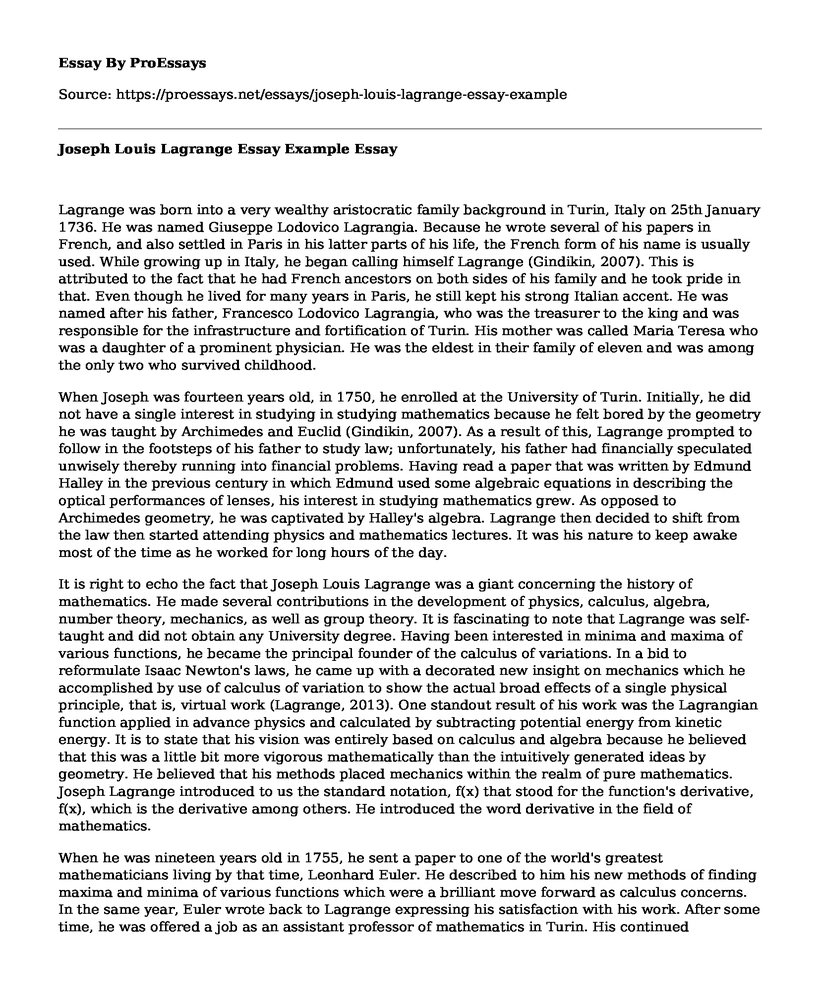Lagrange was born into a very wealthy aristocratic family background in Turin, Italy on 25th January 1736. He was named Giuseppe Lodovico Lagrangia. Because he wrote several of his papers in French, and also settled in Paris in his latter parts of his life, the French form of his name is usually used. While growing up in Italy, he began calling himself Lagrange (Gindikin, 2007). This is attributed to the fact that he had French ancestors on both sides of his family and he took pride in that. Even though he lived for many years in Paris, he still kept his strong Italian accent. He was named after his father, Francesco Lodovico Lagrangia, who was the treasurer to the king and was responsible for the infrastructure and fortification of Turin. His mother was called Maria Teresa who was a daughter of a prominent physician. He was the eldest in their family of eleven and was among the only two who survived childhood.
When Joseph was fourteen years old, in 1750, he enrolled at the University of Turin. Initially, he did not have a single interest in studying in studying mathematics because he felt bored by the geometry he was taught by Archimedes and Euclid (Gindikin, 2007). As a result of this, Lagrange prompted to follow in the footsteps of his father to study law; unfortunately, his father had financially speculated unwisely thereby running into financial problems. Having read a paper that was written by Edmund Halley in the previous century in which Edmund used some algebraic equations in describing the optical performances of lenses, his interest in studying mathematics grew. As opposed to Archimedes geometry, he was captivated by Halley's algebra. Lagrange then decided to shift from the law then started attending physics and mathematics lectures. It was his nature to keep awake most of the time as he worked for long hours of the day.
It is right to echo the fact that Joseph Louis Lagrange was a giant concerning the history of mathematics. He made several contributions in the development of physics, calculus, algebra, number theory, mechanics, as well as group theory. It is fascinating to note that Lagrange was self-taught and did not obtain any University degree. Having been interested in minima and maxima of various functions, he became the principal founder of the calculus of variations. In a bid to reformulate Isaac Newton's laws, he came up with a decorated new insight on mechanics which he accomplished by use of calculus of variation to show the actual broad effects of a single physical principle, that is, virtual work (Lagrange, 2013). One standout result of his work was the Lagrangian function applied in advance physics and calculated by subtracting potential energy from kinetic energy. It is to state that his vision was entirely based on calculus and algebra because he believed that this was a little bit more vigorous mathematically than the intuitively generated ideas by geometry. He believed that his methods placed mechanics within the realm of pure mathematics. Joseph Lagrange introduced to us the standard notation, f(x) that stood for the function's derivative, f(x), which is the derivative among others. He introduced the word derivative in the field of mathematics.
When he was nineteen years old in 1755, he sent a paper to one of the world's greatest mathematicians living by that time, Leonhard Euler. He described to him his new methods of finding maxima and minima of various functions which were a brilliant move forward as calculus concerns. In the same year, Euler wrote back to Lagrange expressing his satisfaction with his work. After some time, he was offered a job as an assistant professor of mathematics in Turin. His continued correspondence with Euler led to a new branch of mathematics that was a calculus of variation. Overwhelmed by Lagrange's works, Euler proposed that he be elected as the as a foreign member of Berlin Academy. He was duly elected (Filippov, 2013). In most of his years, Lagrange believed that coming up with the calculus of variation was the most significant works that established him as one of the greatest mathematicians of the 18th century.
Conclusion
It is important to note while concluding that, as much as history reveals it that mathematics is viewed by many people as not essential and is developmentally inappropriate for the young children, Joseph Louis Lagrange defied all this historical belief. Having developed interest in studying mathematics at a tender age, he later became one of the greatest mathematicians in the world. This was as a result of his early attempts to solve various mathematical problems.
References
Filippov, A. F. (2013). Differential equations with discontinuous right-hand sides: control systems (Vol. 18). Springer Science & Business Media.
Gindikin, S. (2007). Joseph Louis Lagrange. Tales of Mathematicians and Physicists, 213-245.
Lagrange, J. L. (2013). Analytical Mechanics (Vol. 191). Springer Science & Business Media.
Cite this page
Joseph Louis Lagrange Essay Example. (2022, Jul 11). Retrieved from https://proessays.net/essays/joseph-louis-lagrange-essay-example
If you are the original author of this essay and no longer wish to have it published on the ProEssays website, please click below to request its removal:
- Paper Example on Amazon Rainforest - South America Ecosystem
- Edward Henry Weston Biography
- Hellen Hunt Jackson's Solutions to the Late Victorian Era Problems Faced by Native Americans
- Essay on Heteropatriarchy & Settler Colonization: The Social-Economic Impact
- Essay Sample on St. Augustine: Medieval Philosopher, Theologian & Influencer of Western Christianity
- European Colonization of Africa: Political, Social, Economic Effects - Research Paper
- Essay on Andreesen Horowitz: Investing in the Future of Technology & Innovation







